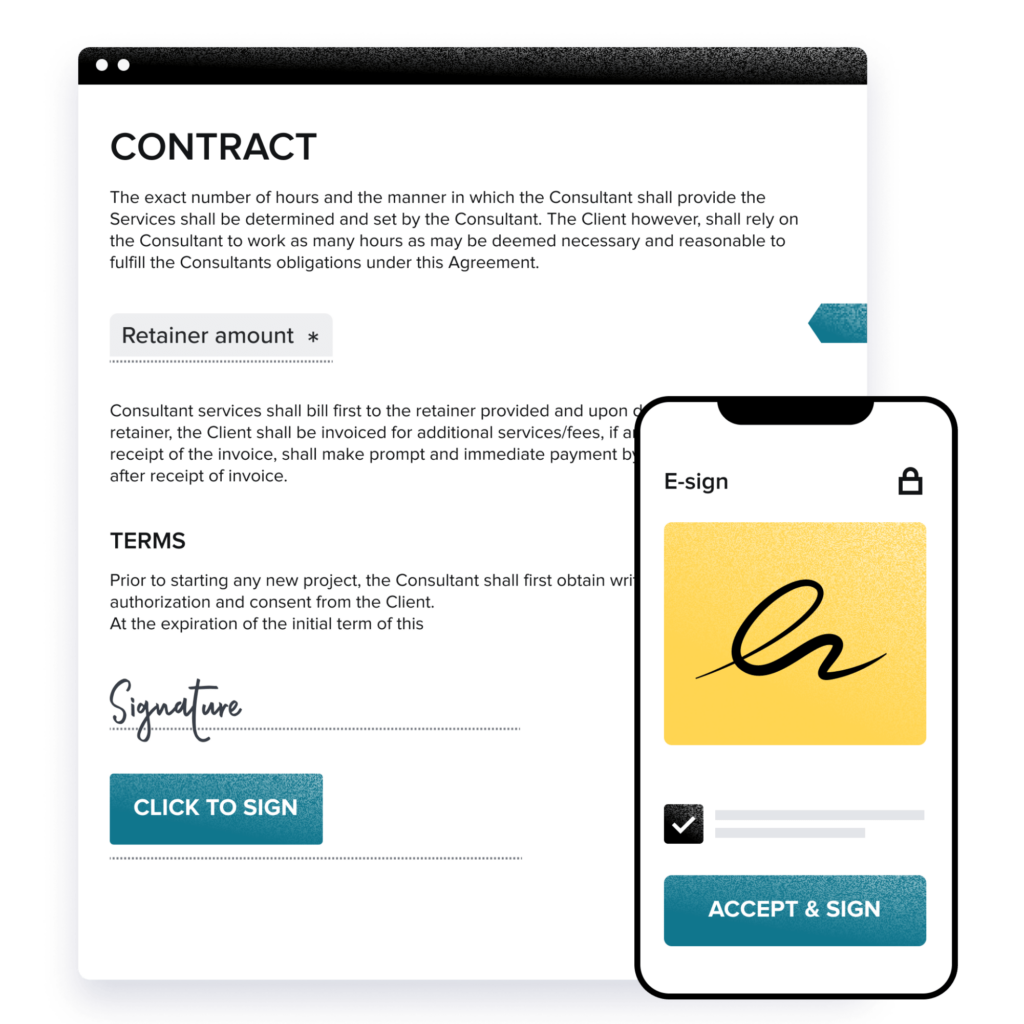A client contract sets the tone for each project you undertake. They protect you and your clients by defining expectations, timelines, payment terms, and more. Read this article to learn everything you should include in these agreements.
As an independent business, contracts are key to what you do. At first glance, you may see a client contract as a formality—a piece of paper both parties sign that gets filed away. That is until you actually need it.
A legal document is worth far more than the paper it’s printed on. It protects all parties involved while defining specific terms and conditions, such as the scope of the project, when and how you’ll be paid, and specific terms for cancellations. But that’s not everything a quality client agreement should include. Read on to learn why these types of business contracts are important and what you should be sure to include
Jump to:
- Why client contracts are important
- What to include in a general contract for clients
- How to improve your client contract workflow
- Get HoneyBook to simplify the client contract & bookkeeping process
Why client contracts are important
Besides providing a legally binding document, client contracts also serve as a service agreement that sets expectations, demonstrates your professionalism, and protects your clients and your business. Let’s dive deeper into a few reasons why business contracts are important when taking on client projects.
They protect your business and your client
Especially during disagreements, client contracts are vital in safeguarding both your business and your clients. Consider a wedding photographer who faces a last-minute cancellation. Without a contract specifying cancellation terms, the photographer stands to lose. However, a well-crafted service agreement with clear cancellation policies guarantees payment for reserved time.
A clear client contract acts as a shield, protecting the interests of both parties and setting a framework for resolving conflicts. It’s an essential tool in maintaining a fair and professional experience.
They set expectations
When you bring on a new client, setting clear expectations right off the bat is key. The hope is to “under-promise and over-deliver.” However, some clients may have their own predetermined expectations, regardless of what you explain to them. That’s why it’s crucial to lay out all the job details in writing.
Clearly outlining the project timeline, the exact deliverables your client will receive, and the specifics of your payment schedule helps your client understand exactly what they can expect and gives you a legal document to support your case in any disagreements. A business contract also sets expectations surrounding cancellations, like when and why a client can and can’t cancel services.
They set goals for the project at hand
Creating effective business contracts doesn’t mean you have to use a one-size-fits-all contract template for every client. Each contract should fit the unique goals you and your client have for the project.
When you’re putting together your client contract, really take the time to chat with your client about what they’re looking to achieve. Make sure you get all these goals and details into the contract you craft for them. This approach not only makes your contract more relevant and specific, but it also shows your client that you’re genuinely invested in meeting their unique needs and delivering results that align with their expectations.
They demonstrate your professionalism
Having effective business contracts isn’t just about the nuts and bolts of the service agreement. It’s also a big part of how professional you look to your clients.
If you arrive at a meeting or job without a legal contract, or with one that’s inadequate, it could make your client question your expertise. However, showing up with a clear, detailed contract demonstrates your professionalism. It helps set the right tone and assures your clients that they’ve hired a professional.
What to include in a general contract for clients.
A strong client agreement includes several sections that clearly define everything you and your client need to know about the project. In particular, every contract you write should include the project scope, timeline, payment terms, contract information and conditions, and clauses for things like late payments, termination, and governing law. Before contract signing, be sure to review all these terms with your client to ensure you’re on the same page.
Standard elements of legal contracts
While you’ll customize your client contracts to your business and your clients, there are some standard elements you should always consider.
- Parties involved: This section identifies all the entities or individuals entering into the contract. It includes their full legal names and relevant details, ensuring clarity about who is legally bound by the contract
- Considerations: This is about what each party is offering or exchanging in the agreement. It could be a service, a product, money, or even a commitment to perform or refrain from certain actions. Consideration is the value that each party brings to the contract, making it a binding agreement
- Mutualities: Also known as mutual consent or meeting of the minds, this means that all parties involved have a common understanding of the contract’s terms and agree to them voluntarily. This mutual agreement is essential for a legal contract’s validity, ensuring that there’s no coercion or misunderstanding
- Dispute resolution: This part outlines how any disagreements or disputes related to the contract will be handled. It might include arbitration, mediation, or the jurisdiction of certain courts. Having a dispute resolution mechanism in place helps manage potential conflicts effectively, without the need for costly and time-consuming litigation
- Acceptance: This element signifies that the parties agree to the terms of the contract. Acceptance must be clear and unambiguous, often demonstrated through signatures. It indicates that all parties understand and agree to the obligations and benefits stated in the contract
Each of these standard elements plays a crucial role in creating a legally binding and effective contract, but there are other elements you should consider as well.
Project scope
The project’s scope is essential to project planning. It’s important to include the project scope in each contract you develop. Some aspects to consider include:
- Project goals: Your goals will typically center around timeframes. For example, if you’re working on a kitchen remodel, you may have goals to strip the current kitchen in the first week, install the floor in the second week, and install cabinets in week three
- Deliverables: This is where you set expectations your client can expect to receive. For example, a photographer may offer deliverables like two portraits, eight wallet-sized photos, and two six-by-nine photos
- Resources: This is a list of the things you need to be able to do the job. These include things like man-hours, base materials, tools, and any other required equipment
- Deadlines: Deadlines tell your client when they can expect the job to be completed
Timeline
The timeline in a client contract is typically covered in the project scope, but it’s so important that it’s worth mentioning twice. As you create the timeline for your project, remember the adage, “under-promise and over-deliver.”
Keep in mind that anything can happen. Employees get sick, weather causes rain delays, and a project you’re currently working on can take longer than expected. When you set your timeline, make sure it gives you enough time to complete the job no matter what happens. If all goes well, your client will only be more pleased when you get the job done early.
Payment terms
their clients. A client may be under the impression that payment is due at the end of the job, while an independent contractor may be under the impression that they’re entering a retainer agreement.
The good news is that this headache is easy to avoid.
As you create your contractor agreements, be sure to include clear, concise payment terms. Your client contracts should tell your clients when payments are due and how they can pay.
Contract information and communication policies
All contracts should have specific information related to the contract. For example, include a line stating that the contract encompasses the entire agreement and that no other warranties are written or verbal. Moreover, you should set clear communication policies. This means, your contract should tell your clients:
- How they can best contact you
- When they should contact you
- How long it typically takes you to respond to messages
The contract should also include any specific instructions for communicating cancellation and change requests.
Contract clauses
Your client contracts should also include specific clauses for the following:
- Late payment: Clearly define late payment fees and potential actions should the client fail to pay as agreed
- Termination: Tell your customers how and when they can terminate their agreement
- Force Majeure: Define what happens if circumstances prevent you from being able to fulfill your side of the contract
- Arbitration: Decide if contract disputes can be handled by a third-party arbitrator
- Governing law: Client contracts are legally binding, but the governing laws they’re bound to must be defined. In most cases, you’ll want your contract governed by the laws in the state in which you do business
How to improve your client contract workflow
When it comes to managing client contracts, especially across diverse projects, efficiency and organization are key. Here are some strategies to streamline your contract workflow:
- Utilize contract templates: Get started with HoneyBook’s customizable client contract templates, designed to fit a variety of project types. Easily adapt them for your project, including key clauses and terms, saving time and effort. HoneyBook’s Template Gallery makes it simple to set up professional contracts that protect your business and keep your processes efficient so you can focus on what matters most
- Implement software for tracking contract statuses: Use contract management software to monitor the lifecycle of each contract. This helps you organize deadlines and milestones, and maintain timely follow-ups
- Allocate specific times for contract negotiation: Schedule set times for contract discussions and finalizations. This method prevents last-minute rushes and allows for thorough review and discussion of any revisions or concerns
- Automate routine tasks: Automate repetitive processes, such as reminders for contract renewals or follow-ups. This frees up time for you to focus on more complex aspects of contract management
- Regularly update contracts: Keep contract templates up-to-date with changes in laws, industry standards, and business practices. Regular updates maintain the relevance and legal compliance of your contracts
- Train your team and provide resources: If you work with a team, make sure they are well-trained in contract management and supply them with the necessary resources and guidelines they need to create, update, and manage your company’s client contracts
- Establish a client feedback loop: Seek feedback from clients about the contract process. This feedback can help you identify areas for improvement and help you to build stronger client relationships
By incorporating these practices, you’ll make your contract management process more efficient, professional, and adaptable to the diverse needs of your projects. This not only saves time but also improves the overall quality of your client interactions.
Get HoneyBook to simplify the client contract & booking process
HoneyBook is an all-in-one clientflow management platform that makes it easy to build and manage your booking process. Create all of your contacts online using HoneyBook’s customizable client contract templates that are designed for a wide range of industries.
While you’re at it, simplify and automate your entire clientflow through HoneyBook. The platform makes it easy for your clients to see when you’re available and book timeslots that work for them. When they do, you can automatically send and execute contracts, send invoices, accept payment, and keep track of your cash flow, giving you time to focus on the more pressing areas of your business.
Disclaimer: The advice featured in this guide and on the blog is for sharing general information and knowledge. For specific legal advice, please consult an authorized professional.









